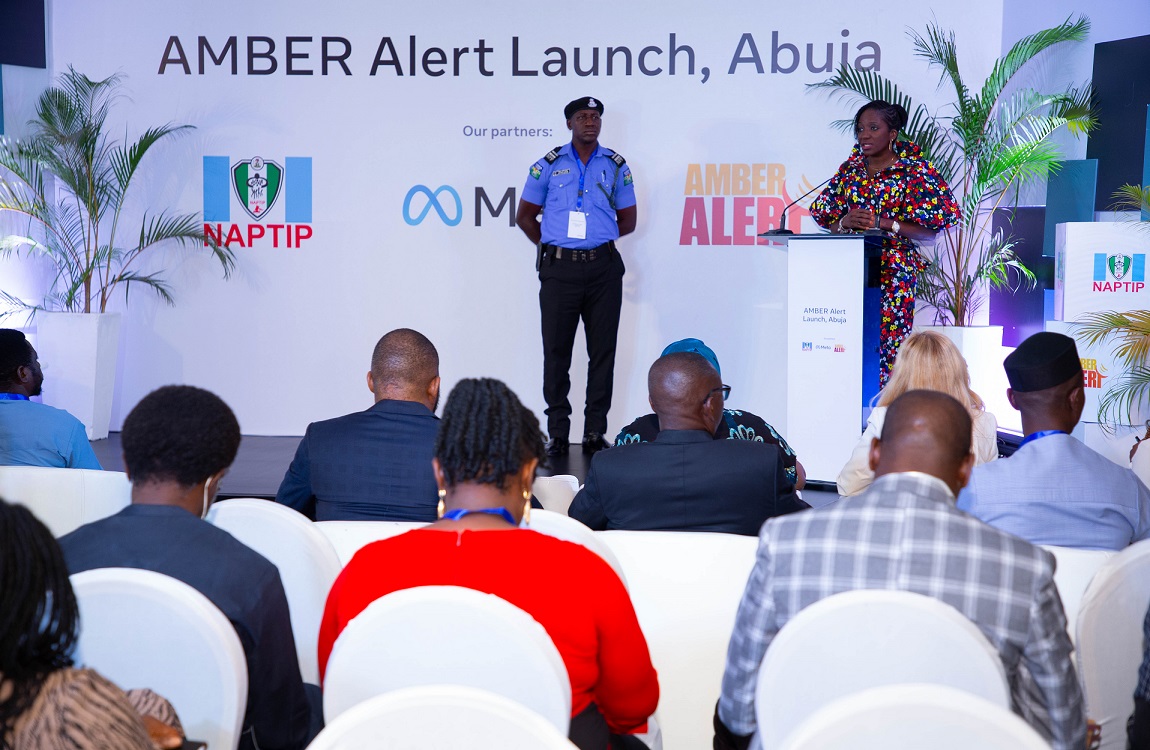General
Meta, NAPTIP Launch Scheme to Help Find Missing Children in Nigeria

By Modupe Gbadeyanka
A programme aimed at helping to find abducted children in Nigeria has been launched by Meta and National Agency for the Prohibition of Trafficking in Persons (NAPTIP).
Meta is the parent company of Facebook, Instagram and WhatsApp. Through this initiative called AMBER Alert, security officials can use these social media platforms to inform people of missing children.
The scheme was unveiled on Wednesday and Meta disclosed that it was designed to increase the chances of finding missing children by putting more people on the lookout for them.
When an AMBER Alert is activated by law enforcement, it will appear on the Facebook and Instagram Feed of users within the designated search area, enabling them to share the information instantly with friends or contact the authorities if they have leads.
AMBER Alert is designed to include important information about the missing child such as a photo description, location of the abduction, and other relevant and available information to aid in immediately identifying the missing child.
How AMBER Alert Works
The decision to declare an AMBER Alert is made by NAPTIP when investigating a suspected abduction case, they must first determine if the case meets their Amber Alert criteria, which include:
- The abduction is of a child age 17 or younger
- NAPTIP must have a reasonable belief that there has been an abduction.
- NAPTIP believes the victim is in imminent danger of serious bodily harm or exploitation.
- There is enough descriptive information about the victim and suspected abduction for law enforcement to issue an AMBER Alert to assist in recovering the child
Once these criteria have been met, NAPTIP will then notify Meta’s Global Security Operations Centre, which operates 24/7, that a verified AMBER Alert is active. Meta will then send the alert to the News Feeds of people located in targeted search areas in Nigeria.
“Already available across 28 countries globally, we are proud to partner with NAPTIP to make AMBER Alert available in Nigeria – the second African country to join this programme.
“When there is a reported case of a missing child, the most valuable thing one can do is share information as quickly as possible. By working with law enforcement in helping to share the right information with the right people, we hope that missing children will be safely reunited with their families faster,” Meta’s Director of Trust and Safety, Emily Vacher.
In emphasising the importance of this launch, Adaora Ikenze, Meta’s Head of Public Policy, Anglophone West Africa, said: “This partnership with NAPTIP is another important milestone in reinforcing our ongoing commitment to Nigeria. We know our apps can be used as a force for good, and the AMBER Alert launch across Instagram and Facebook highlights this.”
The Director General of NAPTIP, Dr Fatima Waziri-Azi, also said, “Today, we are partnering with Meta to launch the AMBER Alert Programme on Facebook and Instagram to help ensure faster response in finding missing children.
“With these alerts, more people can be on the lookout for kids reported missing in their vicinity and report all leads to relevant authorities. NAPTIP cherishes every aspect of the intending collaboration and we are indeed glad to be on board with Meta”.
AMBER Alert Programme launched on Facebook in 2015 and since then has assisted in hundreds of successful child endangerment cases in the US and around the world.
One of such cases happened in 2020 when Amanda Disley and her husband helped rescue 11-year-old Charlotte Moccia of Springfield, Massachusetts, after seeing an AMBER Alert on Facebook. Before that, a four-year-old girl was recovered after Kaytlin Brown saw an AMBER Alert issued on Facebook on her lunch break and quickly took action.
In June 2022, Meta added Instagram to the AMBER Alerts Programme across the world by making it available in 28 additional countries, and now, in Nigeria. As part of the launch of AMBER Alerts in Nigeria, Meta and NAPTIP will be educating users in Nigeria on how to identify AMBER Alerts on their feeds and what to do when they see an alert.
General
BPP Mandates Digital Submission for MDAs From March 1

By Adedapo Adesanya
The Bureau of Public Procurement (BPP) has directed all Ministries, Departments and Agencies (MDAs) to comply with its digital submission process effective March 1.
The directive was contained in a circular signed by the Director-General of the Bureau, Mr Adebowale Adedokun, noting that the move was part of the bureau’s commitment to digital transformation and paperless governance.
It explained that the transition followed an earlier circular of Aug. 4, 2025, which introduced electronic submission procedures.
According to the bureau, it has successfully moved from physical filings to a dedicated e-mail service for document submissions and is now advancing to a more robust and integrated system.
The circular announced the inauguration of the BPP Digital Submission Portal, a web-based platform designed to enable MDAs submit procurement-related documents directly to the Bureau.
It stated that the automated platform would streamline the submission process, enhance transparency and ensure accelerated tracking of procurement-related documents and petitions.
“With effect from March 1, all MDAs will be required to use the portal to submit requests for ‘No Objection’ Certificates, approvals for ‘No Objection’ for special procurements, clarifications and status updates on submissions,” the bureau said.
It added that the portal would be hosted on the Bureau’s official website and would become fully operational from the effective date.
The bureau warned that physical submissions or manual hand-deliveries would no longer be prioritised and would eventually be rejected following the full transition to the digital platform.
It urged accounting officers to brief their procurement departments and ICT units on the development to ensure seamless processing of procurement activities from March 1.
It further advised MDAs to contact the Bureau via its official email for information on the onboarding process and integration into the portal.
The bureau emphasised that full compliance by all MDAs was required to ensure a smooth transition and avoid delays in the implementation of the 2026 fiscal year procurement processes.
General
Senate Seeks Removal of CAC Boss Hussaini Magaji

By Adedapo Adesanya
The Senate has asked President Bola Tinubu to remove the Registrar General of the Corporate Affairs Commission (CAC), Mr Hussaini Ishaq Magaji, from office.
The Senate Committee on Finance, while passing a resolution in Abuja on Thursday, accused Mr Magaji, a Senior Advocate of Nigeria (SAN), of failing to honour the Senate’s invitations to account for the finances of his agency.
“He refused on so many occasions to honour our invitation to appear before this committee.
“We have issues with the reconciliation of the revenue of CAC.
“Each time we invite him, he gives us excuses,” the Chairman of the committee, Mr Sani Musa, said as the committee passed the resolution.
CAC was part of a group of agencies that the House of Representatives Public Accounts Committee (PAC) recommended zero allocation for the year 2026, for allegedly failing to account for public funds appropriated to them.
The committee, at an investigative hearing held two weeks ago, accused CAC and some other ministries, departments and agencies (MDAs) of shunning invitations to respond to audit queries contained in the Auditor-General for the Federation’s annual reports for 2020, 2021 and 2022.
The PAC chairman, Mr Bamidele Salam, stated that the National Assembly should not continue to appropriate public funds to institutions that disregard accountability mechanisms, saying this will create fiscal discipline and strengthen transparency across federal institutions and conform with extant financial regulations and the oversight powers of the parliament.
“Public funds are held in trust for the Nigerian people. Any agency that fails to account for previous allocations, refuses to submit audited accounts, or ignores legislative summons cannot, in good conscience, expect fresh budgetary provisions. Accountability is not optional; it is a constitutional obligation,” he said.
General
IBEDC Promises Stability, Growth After Board Restructuring

By Adedapo Adesanya
The Ibadan Electricity Distribution Company (IBEDC) has announced the reconstitution of its board following the resignation of three nominees of the Asset Management Corporation of Nigeria (AMCON), promising growth and stability.
Earlier this week, the disco, which serves Oyo, Ogun, Osun and Kwara States, as well as parts of Ekiti, Kogi and Niger States, unveiled its new board led by the new chairman, Mr Tunde J. Afolabi.
The newly constituted board include Mr Ayodeji Ariyo Gbeleyi, with Mr Michael I. Magaji as Alternate Director; Mr Taiwo Afolabi; Professor Oladapo Afolabi; Mr Tunde Fayinka; Mr Oluwaseyi Akinwale and Mr Adeolu Ijose.
According to the chairman, the emergence of a new core investor and the reconstituted board marks a significant milestone in the company’s corporate journey and signals a renewed strategic direction focused on stability, continuity and sustainable growth.
“This transition represents renewal, not rupture. It represents investment, not instability. It represents partnership, not division. Our goal is to strengthen governance, enhance operational performance, deepen capital investment and deliver improved service to customers across our franchise areas,” he added.
Mr Afolabi, while addressing customers directly, assured them that there would be no avoidable service disruptions as a result of the transition, stating that all IBEDC offices will remain open, while field operations will continue uninterrupted.
“The new core investor has committed to sustained capital investments in feeder rehabilitation and expansion, transformer upgrades and replacements, injection substation improvements, and the replacement of obsolete network components,” he stated.
He added that IBEDC plans to accelerate the integration of advanced digital and operational technologies, disclosing that these include enhanced outage management systems, strengthened billing platforms, expanded smart metering deployment, and digitised customer engagement channels aimed at improving transparency and service responsiveness.
On workforce stability, the chairman emphasised that there will be no job losses as a direct result of the transition, noting that the board, under his leadership, is committed to employee welfare, improved work tools, modern safety equipment, and technology upgrades to support field efficiency, while maintaining high performance standards.
Mr Afolabi also pledged proactive and structured engagement with regulators, including the Nigerian Electricity Regulatory Commission (NERC) and the Nigerian Electricity Management Services Agency (NEMSA), underscoring its commitment to full regulatory compliance, strengthened governance frameworks, transparency and accountability.
Furthermore, he reaffirmed the commitment of the distribution company to structured and timely payment cycles for vendors and suppliers, recognising their critical role in maintaining network stability.
With the new board in place, he insisted that IBEDC is poised to deepen operational excellence, strengthen financial sustainability, and position itself firmly on the path to becoming Nigeria’s leading power distribution company—powering progress across its franchise with unity, confidence and innovation.
Established in November 2013 following Nigeria’s power sector privatisation, IBEDC operates the largest distribution network serving the highest customer population within Nigeria’s electricity distribution landscape.
-

 Feature/OPED6 years ago
Feature/OPED6 years agoDavos was Different this year
-
Travel/Tourism10 years ago
Lagos Seals Western Lodge Hotel In Ikorodu
-

 Showbiz3 years ago
Showbiz3 years agoEstranged Lover Releases Videos of Empress Njamah Bathing
-

 Banking8 years ago
Banking8 years agoSort Codes of GTBank Branches in Nigeria
-

 Economy3 years ago
Economy3 years agoSubsidy Removal: CNG at N130 Per Litre Cheaper Than Petrol—IPMAN
-

 Banking3 years ago
Banking3 years agoSort Codes of UBA Branches in Nigeria
-

 Banking3 years ago
Banking3 years agoFirst Bank Announces Planned Downtime
-

 Sports3 years ago
Sports3 years agoHighest Paid Nigerian Footballer – How Much Do Nigerian Footballers Earn

















